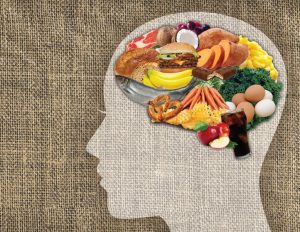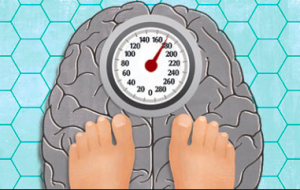 Discussing obesity becomes difficult when considering every side of the “argument.” Between social advocacy to the neurochemistry of weight, many perspectives have to be considered. Body positivity has been a growing concept within society over the past decade, and I would argue that this is a good thing. Often, body image is a socially derived concept and is not just the individual’s physical appearance, but how the individual perceives themselves. In many cases, due to societal pressures, people perceive themselves as heavier than they actually are. These perceptions may lead to mental health concerns, primarily the development of eating disorders. Reward related brain areas are involved in eating disorders. Specifically, in bulimia nervosa, bingeing on foods that taste good leads to the release of dopamine, while the purging of food reduces the signal or effectiveness of acetylcholine. Acetylcholine signaling normally indicates when an individual is full or nutritionally satisfied. In anorexia nervosa, research has suggested that food intake following periods of starvation increases the amount and effect of dopamine within the reward pathway. In cases of anorexia, individuals tend to have a variant of the 5HT2A serotonin receptor responsible for releasing too much serotonin during non-starvation periods. Researchers hypothesize that an individual with anorexia may feel better during a starvation period because it reduces the amount of serotonin. In contrast, individuals with bulimia and binge eating disorder experience lower-than-normal levels of serotonin. In these cases, the individual tends to excessively eat in order to increase serotonin and decrease depressed mood.
Discussing obesity becomes difficult when considering every side of the “argument.” Between social advocacy to the neurochemistry of weight, many perspectives have to be considered. Body positivity has been a growing concept within society over the past decade, and I would argue that this is a good thing. Often, body image is a socially derived concept and is not just the individual’s physical appearance, but how the individual perceives themselves. In many cases, due to societal pressures, people perceive themselves as heavier than they actually are. These perceptions may lead to mental health concerns, primarily the development of eating disorders. Reward related brain areas are involved in eating disorders. Specifically, in bulimia nervosa, bingeing on foods that taste good leads to the release of dopamine, while the purging of food reduces the signal or effectiveness of acetylcholine. Acetylcholine signaling normally indicates when an individual is full or nutritionally satisfied. In anorexia nervosa, research has suggested that food intake following periods of starvation increases the amount and effect of dopamine within the reward pathway. In cases of anorexia, individuals tend to have a variant of the 5HT2A serotonin receptor responsible for releasing too much serotonin during non-starvation periods. Researchers hypothesize that an individual with anorexia may feel better during a starvation period because it reduces the amount of serotonin. In contrast, individuals with bulimia and binge eating disorder experience lower-than-normal levels of serotonin. In these cases, the individual tends to excessively eat in order to increase serotonin and decrease depressed mood.

Additional important concepts discussed within the neurochemistry of weight include high fat diets, weight cycling, genetics, and diabetes. A high fat diet is characterized by the intake of foods high in calories and saturated fatty acids. In the brain, intake of a high fat diet has been shown to lead to apoptosis, or cell death, in rats. Specifically, these neural changes are occurring in the hypothalamus, the brain region responsible for regulatory functions such as eating, drinking, and homeostasis. Once these changes occur, weight cycling begins. People are genetically dispositioned to a certain weight or to becoming overweight and weight cycling aids in this process. Once an individual reaches a certain weight, they may lose weight but be unable to keep weight off, returning to their original weight. These processes are impacted by leptin signaling and energy in the hypothalamus. Individuals require food for energy, but during weight cycling, this energy balance is disturbed during the fluctuation of leptin. These concepts also contribute to diabetes. Approximately 30% of people who are medically categorized as “overweight” have Type II Diabetes. Conversely, 85% of people with Type II Diabetes are categorized as “overweight.” This does not mean that diabetes and weight are inherently related. To develop Type II Diabetes, in many cases, a prolonged consumption of a high fat diet leads to fat accumulation and ultimately, insulin resistance. As we know from previous topics discussed in this course, insulin resistance in the brain increases an individual’s susceptibility to neurodegenerative diseases. Likewise, research has identified that diet and the gut-brain axis must be considered when discussing the onset of disease, mental illness, and neurodegenerative disease.
 Although we understand the issue of obesity from a medical perspective, the social aspect must also be considered. In many cases, individuals who are deemed overweight by physicians do not receive proper medical care. Likewise, individuals of a higher BMI are less likely to seek medical advice, typically due to stigma and the fear of being judged. As someone who has worked in a hospital, I have seen these tendencies first-hand. I have heard nurses comment about a patient’s weight in a derogatory manner, often blaming the patient for their health concerns. As many of us prepare to enter the medical field in some way, we need to consider all aspects of someone’s condition, not just their weight. People are more than their BMI, and typically, weight is a genetically-determined factor within the whole scheme of an individual’s wellness.
Although we understand the issue of obesity from a medical perspective, the social aspect must also be considered. In many cases, individuals who are deemed overweight by physicians do not receive proper medical care. Likewise, individuals of a higher BMI are less likely to seek medical advice, typically due to stigma and the fear of being judged. As someone who has worked in a hospital, I have seen these tendencies first-hand. I have heard nurses comment about a patient’s weight in a derogatory manner, often blaming the patient for their health concerns. As many of us prepare to enter the medical field in some way, we need to consider all aspects of someone’s condition, not just their weight. People are more than their BMI, and typically, weight is a genetically-determined factor within the whole scheme of an individual’s wellness.
https://www.psychologytoday.com/us/articles/199702/body-image-in-america-survey-results
